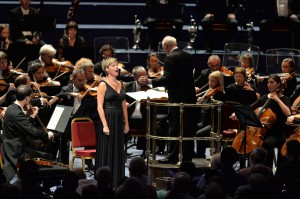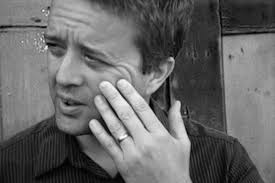Verdi’s Otello is often seen as the most Wagnerian of his works and David Alden’s new production takes this at face value, giving us a psychological insight which is closer to Tristan than Traviata. Jon Morrell’s grey cavernous castle is a world away from the colour and excitement of Venice or North Africa, a womb-like space within which the tragedy unfolds. Even when sunlight pierces the space in act three it does so to highlight the darkness around it. There is no sense of comfort for any of the characters. The final act remains in the open courtyard, Otello snapping Desdemona’s neck and leaving her on the ground, taking his own life distant from her. As in the final scene of Tristan, the onlookers fade away leaving us with the bodies of the protagonists and the brooding, living presence of Iago. It is a magnificent, totally convincing, approach even where it moves away from expectations.
There is no attempt to present Otello as racially different. Stuart Skelton’s massive soldier, both physically and vocally, towers over the cast and brings a dangerous intensity which is at odds with all around him. When faced with the chorus in both the first and third acts he seems like a wounded animal with none of the civilised manners needed for the court. Leah Crocetto’s Desdemonda is similarly an outsider. Her dark hair and ample figure make her an excellent foil for Otello and even in act three where the court are in formal dress with hats she maintains the simplicity of dress she has had throughout. Her equally ample tones fill the theatre thrillingly. I can’t recall a Willow Song presented with such intelligence and power.
It is possible to regard the action as it unfolds as a nightmare within which the protagonists endlessly replay the events of that fateful last day. The English translation helps greatly here. Sung in Italian, it is easy to gloss over the constant nastiness of Iago’s language, but on this evening the incessant spite and vitriol which he spews out is shocking. Jonathan Summers is superb in the part, the voice rasping and aggressive when addressing us yet sycophantic and oily with those around him. Allan Clayton’s more lyrical Cassio and Peter Van Hulle’s sleek Roderigo and subtly sketched in. The choral movement creates a world of dangerous volatility, highlighted in the violence of the opening storm. I did wonder if the opening chorus was amplified in some so, so overwhelming is its impact, but it is surely the placement of the singers and the reflective qualities of the set.
Edward Gardner’s approach from the pit is electrifying and the orchestra were on superb form for the start of the season. How anybody could doubt the quality of ENOs work and justify the cut to their grant in the face of performances like this is utterly beyond comprehension.









